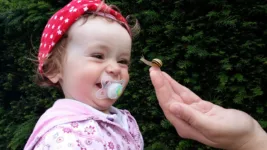Babies are programmed to suck their thumbs and pacifiers, as well as toys or other objects in the first months of life. Their mouth is also their main “testing” organ at this stage, so they are going to suck objects, even when they are not hungry. Some ultrasounds managed to catch unborn babies sucking on their thumbs. This act is soothing the baby, reminding them of their mother’s touch.
But there is a downside to this baby habit: sucking on their thumb or pacifier can damage their palatine and teeth. Recent surveys revealed a link between sucking the pacifier and ear infections in babies.
Thumb sucking
Babies discover their own bodies early on and they quickly develop a habit of thumb sucking. Because they also develop control in their own limbs, thumb sucking becomes more comfortable than a pacifier, which can easily fall from their mouth. The habit of thumb sucking is the start of the baby’s habit of sucking everything they can lay their hands on, in order to discover the world.
Sucking on the thumb for a long time can damage the palatine and the teeth, as well as introduce a lot of bacteria and germs in the child’s mouth, according to Dr. Marina Krepkh, pediatric dentist. A child is prone to have bacteria on their hands, especially when they are toddlers and they are exploring everything. By sucking on their thumb, they insert all that bacteria in their mouths. A certain level of bacteria is good, as it helps the baby develop their immune system, but it is very easy to go overboard, considering the fact their immune system is under development, thus, unable to cope with lots of germs.
Pacifiers
Pacifiers can be used to soothe the baby when they are tensed. Most babies prefer sucking on their thumbs instead of the pacifier, but they can be taught to embrace the latter. One of the most important uses of the pacifier is right before bedtime. According to the American Academy of Pediatrics, sucking on the pacifier can lower the risk of sudden infant death syndrome, which is the main cause of death in infants. However, pacifiers can increase the risk of developing ear infections and can make the baby reject breastfeeding.
Sucking and baby teeth
A child’s habit of sucking their teeth is normal, but it can become dangerous when it is done excessively. During thumb sucking the tongue applies pressure on the thumb and the palatine, which is still under development. In time, the palatine can change its shape, causing a number of issues, from talking problems to eating problems. When teeth begin to emerge, they can suffer misalignment due to intensive thumb sucking. The same effects appear in the case of pacifier use.
Dentists recommend parents to encourage their kids to give up on thumb or pacifier sucking before the age of two. Many children outgrow this habit on their own, but if this doesn’t happen, parents should intervene. Your pediatric dentist can advise you on how to encourage the child to give up on the pacifier and they can examine the child’s mouth and teeth to make sure they are developing normally.








